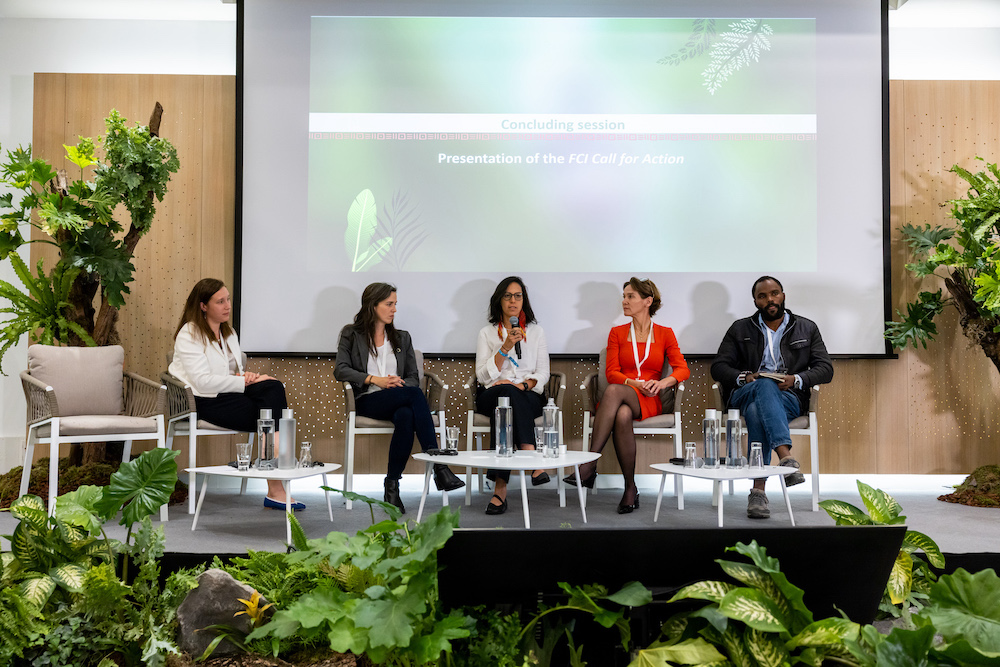
Insights, Solutions, and Outcomes from the FCI Workshop
News
During the Forests and Communities initiative's international conference on November 22 and 23, three panels were organized to address crucial themes related to forest conservation.
- Panel 1 - Effective forest conservation by indigenous peoples and local communities: rights-based and gender-sensitive approaches
- Panel 2 - The use of environmental law in forest conservation
- Panel 3 - Reconnecting national/international funding and governance of indigenous peoples and local communities for forest conservation
Following these discussions, the conference continued with three workshops on the panel topics. The aim was to have in-depth discussions on the topics addressed and to propose concrete ideas. Conference participants came from a wide variety of backgrounds and continents, so the discussions were very rich, with concrete examples of solutions in some regions that could be exported to others.
All the notes and proposals from the workshop are available here.
What emerged from the discussions:
- Theme 1 - Effective Forest conservation by indigenous peoples and local communities: rights-based and gender-sensitive approaches
There is a need to build the capacity of indigenous peoples and local communities on the rights they have, by giving them the opportunity to receive training on these issues. This means recognizing and respecting their traditional rights and ownership of forest land.
In addition, it is important to promote the empowerment and capacity-building of women, giving them the resources and conditions, they need to participate actively in forest preservation. This can include measures such as childcare services and community assemblies tailored to women's needs.
To ensure equal participation in decision-making processes, it is essential to take social and cultural aspects into account when managing forest ecosystems. By integrating these elements, we can create inclusive and equitable environments for forest conservation.
It is essential to support community innovation. This can include promoting gender alliances through legislative initiatives, gathering in-depth data on community needs and implementing participatory management plans.
- Theme 2 - The use of environmental law in forest conservation:
It is necessary to harmonize current legal systems with indigenous customary law to ensure political continuity and guarantee access to information to strengthen civil society, particularly indigenous peoples. Access to justice for indigenous peoples is a major challenge, not least because of the lack of funding to support legal proceedings.
It is also important to build the capacity of legal professionals in environmental and IP & IC law, so that they can apply it more effectively. Forest rangers also play an important role, but they are not sufficiently equipped or supported to enforce the laws.
It is also crucial to establish minimum standards for companies whose supply chains affect forest ecosystems. In addition, it is essential that the private sector assumes greater responsibility and makes progress in this area.
Internationally, we need to see greater representation of indigenous voices at COPs.
- Theme 3 - Reconnecting national/international funding and governance of indigenous peoples and local communities for forest conservation
There is a systemic problem linked to the lack of an adequate financial mechanism to support conservation actions carried out by IPs & LCs.
In addition, indigenous peoples need better incentives to defend their territories and avoid migrating to the cities. A structural problem surrounding land titles particularly affects indigenous populations.
It is important to put in place a process of support and funding to strengthen community capacity and governance, including administrative capacity. Donors should also visit project sites to better understand the cultural and environmental contexts. Finally, the creation of regional funds and other innovative mechanisms based on co-creation between donors and IPs & LCs could be an effective solution.

